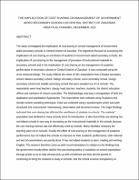| dc.description.abstract | The study investigated the implication of cost sharing in school management of Government aided secondary schools in Central District of Zanzibar. The objectives focused on examining the implication of cost sharing on enrolment of students in Government aided secondary schools, the implication of cost sharing on the management of provision of instructional materials in secondary schools and in the implication of cost sharing on the management of academic performance in secondary schools in Central District of Zanzibar. It was conducted using the cross sectional design. The study reflects the views of 361 respondents from Chwaka secondary school, Mwera secondary school, Kiboje secondary school, Uzini secondary school, Dunga secondary school and Jendele secondary school that were sampled out of 13 schools. The respondents were head teachers, deputy head teachers, teachers, students, the district education officer and members of school committee. The Methodology used was a triangulation of both the qualitative and quantitative Approaches. The respondents were selected using Purposive and Simple random sampling techniques. Data was collected using a questionnaire which was both structured and unstructured, interviewing, observation and document review. The major findings indicated that cost sharing has affected the enrollment of students in schools. The students‟ population had declined in many schools since its introduction. It also found that cost sharing has not helped schools in any way in increasing on the instructional materials in the schools because the cost sharing revenue was not effectively used by schools .Many facilities necessary for teaching were not in schools. Finally the effect of cost sharing on the management of academic performance has not helped the schools to improve on their academic performance, both national and end of examinations are poorly done. It has not helped students to learn, reading and writing English. The research therefore came up with recommendations in relation to the findings that the government should either abolish the cost sharing policy or subsidize on school expenditure through grants so as to help schools pick up with enrollment and thus aid the parents in continuing to bring the students to study in schools, that the school exercise transparency in
dealing with financial accruals from cost sharing in terms of expenditure and refocus it on increasing on the instructional materials in the schools and finally that schools should monitor the management of academic performance in schools in form of daily attendance, encouraging those who have dropped off from schools and also subsidize the parents efforts financially so that they can maintain their children at school. | en_US |

